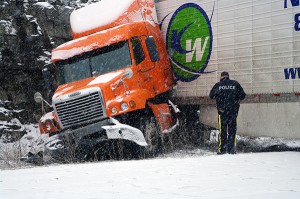Home »

Mandatory commercial truck driver training coming
British Columbia is introducing mandatory entry-level training (MELT) for new Class 1 commercial driver’s licence applicants.

B.C.’s program will exceed the minimum requirements set by the National Safety Code Standard for entry-level training of Class 1 drivers.
“Having mandatory entry-level commercial vehicle training will result in better-trained new drivers and improved road safety for everyone in British Columbia,” said Rob Fleming, Minister of Transportation and Infrastructure. “We’ve worked collaboratively with the trucking industry to create a new MELT program for B.C. that will strengthen the industry and prepare drivers to operate safely across B.C.’s challenging climates. This training will ensure new commercial drivers are trained to a higher, consistent standard.”
MELT for Class 1 driver’s licence applicants will become a prerequisite for Class 1 road testing starting Oct. 18.
B.C.’s program will include best practices from other Canadian jurisdictions and emphasize safe operating practices for mountainous geography and diverse driving conditions to ensure commercial drivers are prepared for B.C.’s highway network and the changing weather patterns encountered in the mountains, stated a March 31 Ministry of Transportation and Infrastructure media release.
“Mandatory training for those operating the largest vehicles on our roads will improve safety across B.C.,” said Minister of Public Safety and Solicitor General Mike Farnworth. “MELT is a vital step to furthering the success our province has seen in reducing traffic fatalities in recent years.”
B.C.’s Class 1 MELT program for new drivers of heavy commercial vehicles will stipulate a minimum required number of practical behind-the-wheel driving hours, in-yard hours and theoretical instructional hours. ICBC is the regulatory body for driver training schools and instructors in B.C. and is consulting with the commercial driving industry, the Ministry of Transportation and Infrastructure and Ministry of Public Safety and Solicitor General to finalize the curriculum.
“Safer Roads Canada is pleased to see British Columbia join the other western provinces in rolling out a MELT program that takes into account the challenging driving conditions and terrain in this province, including winding, narrow mountain passes and icy highways,” said Lawrence and Ginny Hunter, Safer Roads Canada board members, whose 18-year-old son Logan was fatally injured in the 2018 Humboldt Broncos bus crash. “We hope this program succeeds in putting better-skilled new drivers on Canada’s roadways so future tragedies can be prevented. This is a step in the right direction in recognizing the challenging conditions these workers face every day on our roads.”
The program will be delivered by licensed driver training schools in B.C. beginning in early summer 2021.
Consultation with the trucking and driver training industries in 2019 has provided valuable input to support the development of B.C.’s MELT program, the ministry noted.
The Class 1 MELT program is being designed to align with the new Standard 16-Class 1 Entry-Level Training framework introduced as part of the National Safety Code in February 2020, and with mandatory Class 1 entry-level training standards in other Canadian jurisdictions.
Legislation to support the introduction of B.C.’s Class 1 MELT program was passed in August 2020 by the Province in Bill 2, the Motor Vehicle Amendment Act, 2020.
“MELT will improve the behind-the-wheel driver training for people before they become commercial drivers, which will ultimately improve safety on our roads. Creating a higher standard of competence before people can be licensed will help improve driver decision-making, leading to fewer mistakes on the road. The BCTA is supportive of this positive move by the provincial government, as the new driver training program will benefit us all,” said David Earle, president, BC Trucking Association.
Existing B.C. Class 1 drivers will be exempt from MELT.
Lead image: A commercial transport crosses the Kootenay River Bridge at Skookumchuck. e-KNOW file photos
e-KNOW file photo
e-KNOW







